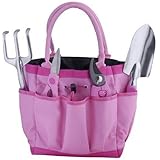Organic gardening and conventional vegetable gardening differ in pest control and fertility: organic gardening utilizes organic weed killer and organic fertilizer.
Differences between Organic Gardening and Conventional Vegetable Gardening
Organic gardening is defined as a system that excludes the use of synthetic fertilizers, pesticides, and growth regulators. Beyond that, technology and horticultural practices between conventional vegetable gardening and organic gardening production don't differ that much. The main difference is that organic gardening features compost as both mulch and organic fertilizer, and organic gardening features organic pest control and organic weed killer.
Rather than utilizing synthetic products to feed the soil, organic gardeners rely on:
1. Crop rotations
2. Crop residues
3. Animal manures
4. Legumes
5. Green Manures
6. Organic Wastes
7. Mineral-bearing rocks
Organic Gardening Pest Control (weeds, insects, etc.) Methods and Means
1. Mechanical cultivation
2. Cultural, biological and bio-rational controls (for example, compost tea, which is literally a tea made from compost and water.)
Benefits of Organic Gardening versus Conventional Vegetable Gardening
Benefits of organic gardening may include:
1. Premium price at markets
2. Reduced production costs
3. Improved gardening safety
4. Reduced environmental impact
5. A better functioning agroecosystem (For example, organic fertilizer - compost - improves soil structure, texture, and aeration and increases the soil's water-holding capacity.)
The commercial organic farming industry is regulated and organic farmers must meet certification standards. For organic compost, for example, the National Organic Standard is strict. Here is why:
Organic gardening compost or organic fertilizer often relies heavily on raw livestock manure, which can carry pathogens that pose a danger to human health. The strict rules for organic compost mixes are in place to prevent food contamination. Additionally, agricultural workers or home gardeners who handle or breathe the pathogens may be at risk.
To kill most microorganisms that are harmful to humans, the compost pile must be maintained at high temperatures (temperature between 131 and 170°F for at least three days in a static or enclosed vessel system, or at least 15 days in a windrow system, with at least five turnings.)
Packaged Organic Gardening Potting Soil and Organic Fertilizer Mixes: OMRI listed and Certified Organic
If you buy pre-packaged organic soil blends or organic fertilizer mixes, make sure it has on the label, "OMRI Listed." The Organic Materials Review Institute evaluates products and processes for the organic industry. The products they list have been reviewed and tested, and found to be consistent with the National Organic Standard's requirements. My favorite packaged mix is Black Kow® because I have used it for many years, with consistently good results. An organic product that is "certified organic" has met the regulations.
Author of this article Sally Morton
business and pleasure. A former writer for Who's Who publications and an international business association, I currently write a gardening column for "The Good Life" print magazine and I write about virtual assisting for www.gardenandhearth.com.
Saturday, December 4, 2010
Organic Gardening
Posted by
JACK-COM
at
2:52 AM
![]()
Labels: Organic Gardening
Subscribe to:
Post Comments (Atom)
Gardening, organic gardening, home gardening, container gardening, indoor gardening, landscaping' landscaping idea, landscaping design, landscaping tradeshow, homedesign, home interior design
| Allright Reserved Gardening Landscaping | Powered BY B L O G G E R | Design Layout by QQ SAMUDRA |




0 comments:
Post a Comment